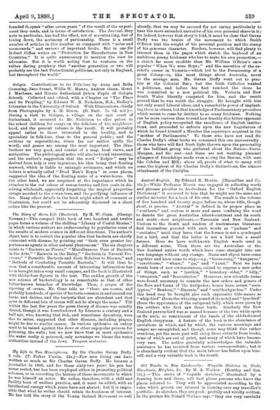Austral-English. By Edward E. Morris. (Macmillan and Co. 16s.)—While Professor
Morris was engaged in collecting words and phrases peculiar to Australasia for the "Oxford English Dictionary," it occurred to hiin that he might use the same and similar material for a book of his own. The result is the volume of five hundred and twenty pages before us, whose title, though short, is precise. " Austral " is defined in its proper place as "southern," and custom is more and more confining the word to denote the great Australian island-continent and its south and south - west neighboars, — Tasmania and New Zealand. Visitors to the South and readers of Australasian literature find themselves puzzled with such words as " jackass " and "cockatoo," until they learn that the former is not a quadruped but a bird, and that the latter is not a bird but a small farmer. Here we have well-known English words used in a different sense. Then there aro the Australian or the New Zealand native words which have come straight into our own language without any change. Name and object have come together and have come to stay,--e.g., "boomerang," "kangaroo," " corobboree," " whare," "pa," and " kauxi." Next we have words born of new circumstances, coined to express a new order of things, such as " larrikin," "boundary - rider," "billy," " swagman," and "free-selector." Moreover, new scientific terms were found necessary to connote the new orders and genera of the flora and fauna of the Antipodes; hence have arisen "euca- lyptus," "Banksia," " dinornis," and " ornithorhynchus." Under this head may be brought also such expressive title-names as "whip-bird" (from the whizzing sound of its note) and" lyre-bird" (from the appearance of the outspread tail), which were given by the settlers who first saw these birds. Similarly the New Zealand parson-bird was so named because of the two white spots on its neck, so reminiscent of the bands of the old-fashioned English clergyman. A feature of the book is the abundance of quotations in which, and by which, the various meanings and usages are exemplified, and though some may think this rather overdone, yet the more part will enjoy these extracts from books, some of which are out of print, and many of which have become very rare. The author gratefully acknowledges the valuable assistance he has received from various correspondents ; but it is abundantly evident that the main labour has fallen upon him- self, and a very valuable book is the result.


































 Previous page
Previous page